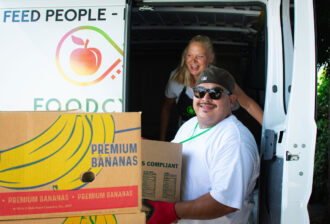The United States is one of the world's largest producers of food, and yet the statistics around food waste are extreme:
- Food waste is the single most common material landfilled in the country, amounting to 24% of landfilled municipal solid waste. (EPA, 2023)
- At the same time, 13.5% of U.S. households were food insecure in 2023. (USDA, 2024)
Food waste has been referred to as the "world's dumbest problem," but we can reverse it with both national and small-scale efforts alike. This page is dedicated to sharing the research and educational materials created by grantees through SARE's one-time Food Loss and Waste Training and Technical Assistance Grant Program. (Learn more about this grant program.)
There are many ways to tackle the issue of food loss, from the farm field to the kitchen table and everywhere in between. Here's what our grantees are doing:
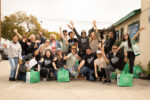
Directing Surplus Food to Los Angeles Food Deserts
FoodCycle's project addresses gaps in the food recovery system by developing a systematic approach to reducing food waste in Los Angeles County. It will create a comprehensive strategy, integrating recovered food into the food system, by considering its environmental, social, and economic impacts. FoodCycle is a food recovery nonprofit located in Los Angeles. We have […]
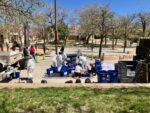
Reducing Food Insecurity and Waste at Hispanic Serving Institutions
To reduce student food insecurity and empower community-minded graduates from diverse socio-economic contexts, students at each University of New Mexico main and branch campus will inventory food waste, implement projects, evaluate waste reductions, then scale a single strategy across all campuses, and evaluate and share best practices. The SARE project will demonstrate that undergraduate students […]
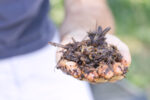
Upcycling Community Food Waste With Insect Allies
This project will pilot an approach to insect-assisted waste upcycling in the urbanized northeast United States to equip communities with knowledge and experience to partner with insects to recapture lost food and transform it into animal feed and soil amendments. Our project is really focused on demonstrating a process, and then getting the word out […]
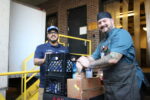
Good Food Belongs to the People of Southwest Ohio
Last Mile prevents food waste by rescuing fresh food and delivering it to organizations serving those with food insecurity. Aiming to keep 6 million pounds of food out of landfills per year, Last Mile will grow and retain more food donors, and lead regional education and awareness efforts on food waste prevention. We are just […]

Milk Waste Reduction Strategies in Childcare Centers
More than 66% of U.S. preschoolers attend a childcare setting daily, and up to 40% of the milk served there is wasted. The proposed study aims to estimate and reduce preschoolers' milk waste in childcare centers in Illinois that participate in the Child and Adult Care Food Program (CACFP). We are going to be developing […]
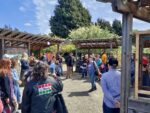
Nationwide Gleaning Effort On Reducing Food Waste
The Association of Gleaning Organizations’ (AGO) SARE project is a comprehensive project to measure the scale of the problem of on-farm food loss and fresh produce waste nationwide and to build the capacity of gleaning organizations to address this issue. AGO is a national organization that focuses on building the capacity of local gleaning organizations. […]

Reducing Food Waste and Enhancing Specialty Crop Farm Viability
The Good Acre is taking a multi-prong approach to reducing food waste that includes wholesale-specific technical assistance for produce farmers, and buyer education and support intended to increase customer flexibility and establish a “seconds” market. This project aims to decrease food waste, increase food access, and support small produce farms. We are Minnesota's largest nonprofit […]
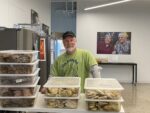
Less Food Waste, More Family Meals: Encouraging Shared Mealtime
Founded in January 2020, Pete’s Garden makes it easier for families to share wholesome meals together at home. Our food recovery operations recover high-quality, surplus prepared foods from Kansas City area caterers, restaurants, and food service operations. Volunteers package the food into family-sized meal portions in reusable take-home containers. The meals are distributed free through […]
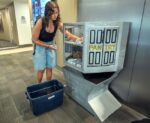
Diverting Food Waste from an Urban Public University
Virginia Commonwealth University (VCU) is embarking on a transformative project to address the dual challenges of food waste and insecurity, establishing itself as a leader in sustainable food management. As a large urban university in Richmond, Va., with over 30,000 students, VCU recognizes the environmental, social, and economic impact of food waste and is committed […]
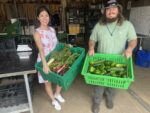
Waste Not, Want Not–Kentucky Feeding Network
The Waste Not, Want Not–Kentucky Feeding Network project leverages community-based participatory research to develop and implement outreach materials that reduce food loss and waste of farm-fresh foods. We concentrate on recovery and distribution across four different types of nonprofit community food programs, with a plan to expand our reach with new community partners. Our partner […]
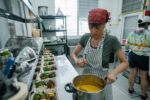
From Food Waste to Culturally Valued Communities
Que No Se Pierda La Cosecha is a rural grassroots initiative of El Departamento de la Comida, a food hub that transforms food loss into food culture through educational materials, recipes, community gatherings, and value-added products. “El Depa” is a nonprofit food sovereignty organization in San Salvador, which is a barrio in the municipality of […]
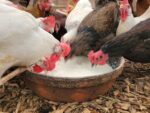
Guide for Feeding Food Waste to Hogs and Hens
This project will research optimized food loss and waste diets for hogs and laying hens and, using nutritional and sensory data and stakeholder outreach, develop a publication, The Waste-Feeder’s Manual, with practical guidance for waste-feeding to reduce waste and improve social and environmental outcomes. We are a nonprofit agricultural center that focuses on providing innovative […]

Upcycling On-Farm Food Waste Through Gleaning and Education
Concrete Jungle provides a simple solution to two complex issues—food waste and food access—by harvesting and procuring neglected produce from fruit trees and farms to serve families facing food insecurity. The Concrete Jungle team can frequently be found under a fruit tree or in a field picking produce. Our mission is foraging, farming, and supporting […]
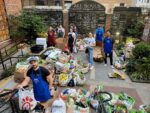
Low-Income Public Housing Food Rescue Operations
Gotham Food Pantry seeks funding to reach more of New York City's Housing Authority complexes. Each pantry offers food rescued from local businesses, such as grocery stores, commercial kitchens, bakeries, produce markets, catering halls, and restaurants. Tenant leaders work with staff to solicit donations, schedule deliveries, and coordinate distribution and community engagement. Gotham Food Pantry […]
